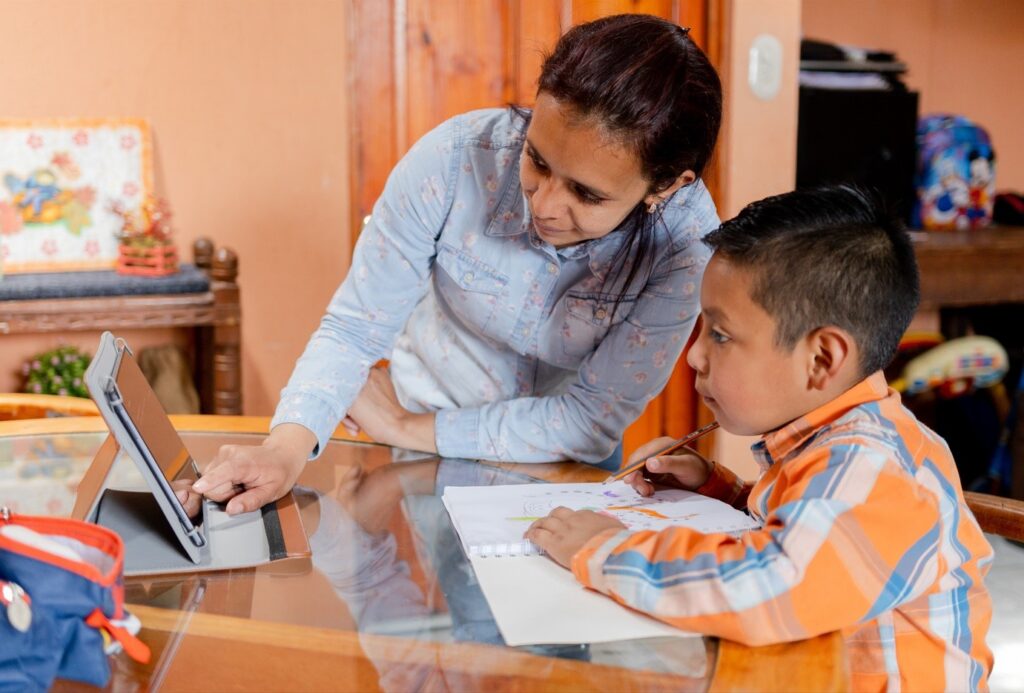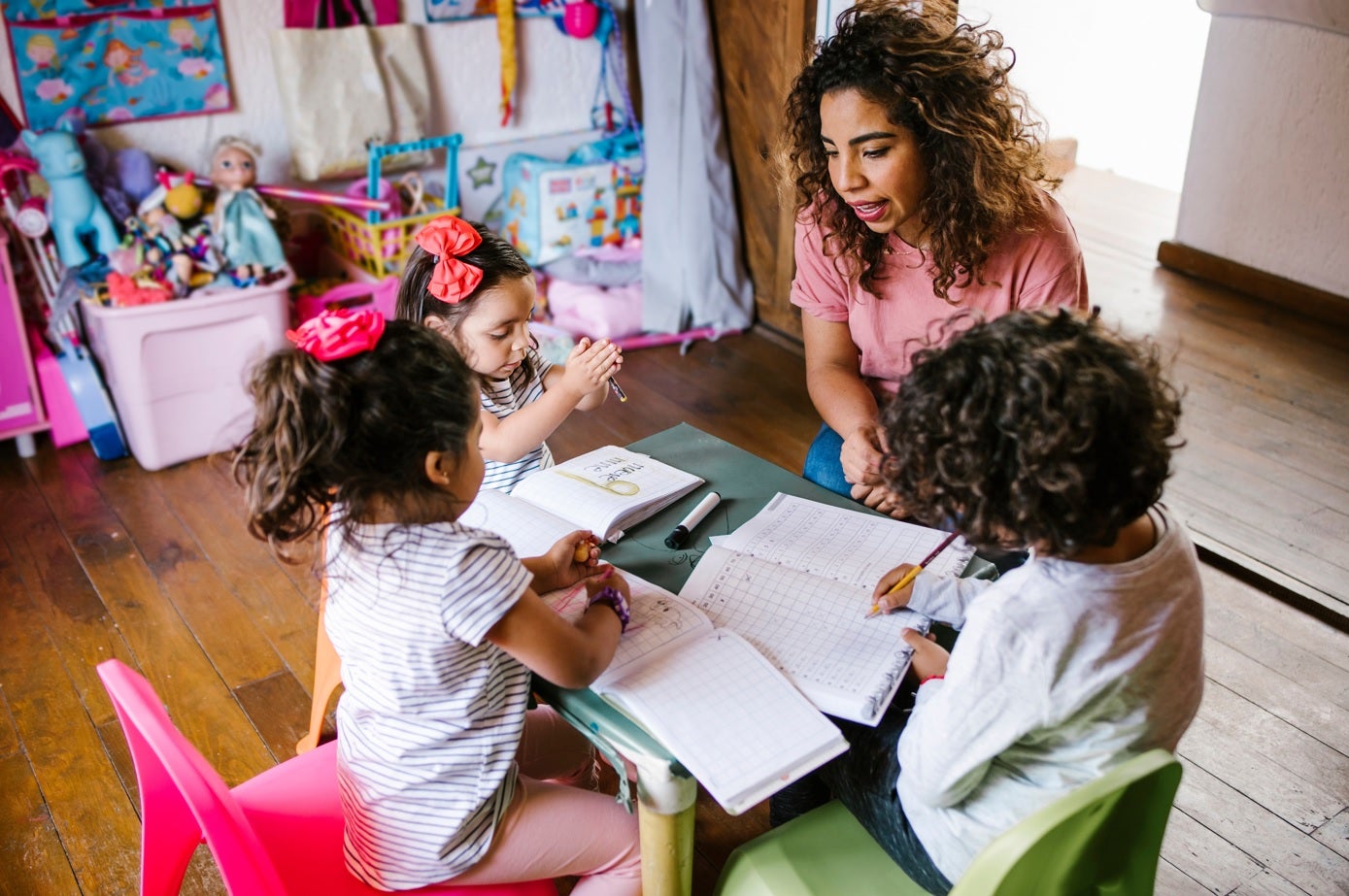The COVID-19 pandemic has caused nearly 15 million excess deaths across the globe. Although mortality rates are lowest among children and youth, the young face another emergency: the learning crisis. Around the world, the disruption of education has meant that millions of children have lost the academic learning they would have gained if they had been in the classroom, with the youngest and most marginalized children suffering the greatest losses.
Children and youth in Latin America and the Caribbean (LAC) lost more schooldays than their peers in any other region in the world. Between March 2020 and March 2021, schools were closed to face-to-face education an average of 158 days (UNICEF), 166 percent more days than the global average of 95 days.
In 2022, most countries in the region are resuming in person learning, but the severity of the effects of the virus on children and youth are becoming more and more obvious and alarming. Enrollment rates fell throughout LAC. Although estimates of learning losses are still being assessed, available data is chilling. In Sao Pablo, Brazil, during school closures students learned only 27.5% compared to when they were learning in person. School closures also increase the risk of malnutrition due to missed school meals. Domestic violence against students increased, as did mental health problems such as anxiety, isolation and depression. A 2020 survey in LAC reveals that one-fourth of youth aged 13-29 reported anxiety, with 43% of women and 31% of men feeling pessimistic about the future (UNICEF 2020).
Given the magnitude of learning loss, merely reopening schools is not enough. We can still avoid a lost generation of students, but decisive action is urgent. Intensive support to make up for lost education and rebuild children’s physical and mental health, social development, and nutrition. The question is what strategies to implement?
The answer is not straightforward: strategies should aim not only at recovery but also address structural problems through more ambitious reforms. At the same time, the region faces significant fiscal limitations over the next years.
In this context, policy makers must carefully assess the trade-offs, effectiveness, and costs of any policy responses, prioritizing those most effectively aligned to their policy goals.

Three evidence-based strategies to adress learning loss and transform LAC education systems
- Ensure in person learning and leverage technology for learning
A growing body of evidence suggests that schools can be opened safely with limited health effects. Given the critical role of schools in the academic, social and emotional development of children, school reopening for in-person instruction is a top priority for all LAC education systems. There is a wide variety of guides, protocols, and reports on how to re-open schools safely and the minimum requirements to do so developed by countries, specialized agencies, and multilateral organizations.
The basic recommendations are:
- bring decision-making to local officials who are closer to the ground and better placed to assess community risks.
- promote a safe environment by improving school infrastructure and health protocols (such as ventilation and the use of masks).
- avoid mass closures by reducing groups with access to in-person learning.
While returning to in-person learning, countries should harness the enormous potential of technology to foster learning. The digital transformation of education allows to enhance both traditional group instruction as well as self-paced learning and more personalized experiences.
The use of technology in the school setting also helps overcome capacity constraints to offer support outside of school hours and leverage student engagement while equipping them with digital skills. To successfully use technology for learning, evidence suggest that it is necessary to:
- expand access, closing socioeconomic disparities in access to devices and connectivity
- ensure technology-based learning interventions that tailor instructional experiences to student needs and performance levels as they are more effective
- integrate technology into school management to record activities, inputs, and student performance to provide principals and school staff with information to make educational decisions and effectively manage school resources
- adopt evidence-based digital contents and pedagogical practices that take advantage of the benefits offered by education technologies in the classroom and outside of school hours. Technology by itself will not automatically impact student learning if the same pedagogical practices are used.
- Finish the unfinished learning and provide pathways for successful learning
As schools re-open, administrators, principals and teachers face the dual challenge of improving learning for all and closing learning gaps. To do this, it is necessary to design an effective learning recovery plan that ensures consistency among assessments, learning objectives and pedagogical approaches.
The following strategies should be considered:
- Diagnose missed contents and quantification of learning losses in core subjects using both continuous formative assessments, as well as summative assessments in the transition years between grade-levels.
- Use automatic promotion together with targeted support for students and only as a temporary measure.
- Implement specific programs to close the learning gap including a mix of instructional approaches (such as accelerated learning and adaptive instruction) as well as additional instructional time during the school breaks.
- High-intensity tutoring for students in need of support beyond the general classroom to stem learning losses (virtual tutoring can help reduce costs).
- Reengage students and prevent dropout
Reengagement of students after extended school disruption requires a multisectoral approach, and the involvement of actors beyond the school, including community organizations and parents.
A variety of proactive approaches are available to find and reconnect with students. For example, in the City of Buenos Aires, Argentina, the program “Deci Presente” conducts home visits to students who did not connect to remote lessons or did not re-enroll. The program also tracks learning progress through bi-monthly pedagogical assessments and provide academic support.
Text messages nudges are also been effective to reinforce students’ engagement in academic activities. Text messages to high-school students or their caregivers reduced dropouts during the lockdown in the State of Goiás, Brazil (Lichand and Christen 2021).
There may be no silver bullet for responding to the devastating effects of prolonged pandemic-related school closures, but the literature offers insights into evidence-based policies and models governments and school systems can use to address the myriad of challenges faced by LAC education systems.
The IDB’s new Flagship Publication How to reboot education post-pandemic: Delivering on the promise of a better future for youth presents more detailed recommendations on evidence-based models and policies that are scalable and available to be put into the context of country-specific needs.

Please share any additional strategies implemented in your country to reduce learning loss, drop out of school and build a more inclusive education system in the pos pandemic era.


Leave a Reply